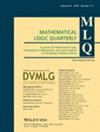下载PDF
{"title":"拉姆齐选择原则对 ZF$\\mathsf {ZF}$ 的影响","authors":"Lorenz Halbeisen, Riccardo Plati, Saharon Shelah","doi":"10.1002/malq.202300024","DOIUrl":null,"url":null,"abstract":"<p>The Ramsey Choice principle for families of <span></span><math>\n <semantics>\n <mi>n</mi>\n <annotation>$n$</annotation>\n </semantics></math>-element sets, denoted <span></span><math>\n <semantics>\n <msub>\n <mo>RC</mo>\n <mi>n</mi>\n </msub>\n <annotation>$\\operatorname{RC}_{n}$</annotation>\n </semantics></math>, states that every infinite set <span></span><math>\n <semantics>\n <mi>X</mi>\n <annotation>$X$</annotation>\n </semantics></math> has an infinite subset <span></span><math>\n <semantics>\n <mrow>\n <mi>Y</mi>\n <mo>⊆</mo>\n <mi>X</mi>\n </mrow>\n <annotation>$Y\\subseteq X$</annotation>\n </semantics></math> with a choice function on <span></span><math>\n <semantics>\n <mrow>\n <msup>\n <mrow>\n <mo>[</mo>\n <mi>Y</mi>\n <mo>]</mo>\n </mrow>\n <mi>n</mi>\n </msup>\n <mo>:</mo>\n <mo>=</mo>\n <mrow>\n <mo>{</mo>\n <mi>z</mi>\n <mo>⊆</mo>\n <mi>Y</mi>\n <mo>:</mo>\n <mo>|</mo>\n <mi>z</mi>\n <mo>|</mo>\n <mo>=</mo>\n <mi>n</mi>\n <mo>}</mo>\n </mrow>\n </mrow>\n <annotation>$[Y]^n:= \\lbrace z\\subseteq Y: |z| = n\\rbrace$</annotation>\n </semantics></math>. We investigate for which positive integers <span></span><math>\n <semantics>\n <mi>m</mi>\n <annotation>$m$</annotation>\n </semantics></math> and <span></span><math>\n <semantics>\n <mi>n</mi>\n <annotation>$n$</annotation>\n </semantics></math> the implication <span></span><math>\n <semantics>\n <mrow>\n <msub>\n <mo>RC</mo>\n <mi>m</mi>\n </msub>\n <mo>⇒</mo>\n <msub>\n <mo>RC</mo>\n <mi>n</mi>\n </msub>\n </mrow>\n <annotation>$\\operatorname{RC}_{m} \\implies \\operatorname{RC}_{n}$</annotation>\n </semantics></math> is provable in <span></span><math>\n <semantics>\n <mi>ZF</mi>\n <annotation>$\\mathsf {ZF}$</annotation>\n </semantics></math>. It will turn out that beside the trivial implications <span></span><math>\n <semantics>\n <mrow>\n <msub>\n <mo>RC</mo>\n <mi>m</mi>\n </msub>\n <mo>⇒</mo>\n <msub>\n <mo>RC</mo>\n <mi>m</mi>\n </msub>\n </mrow>\n <annotation>$\\operatorname{RC}_{m} \\implies \\operatorname{RC}_{m}$</annotation>\n </semantics></math>, under the assumption that every odd integer <span></span><math>\n <semantics>\n <mrow>\n <mi>n</mi>\n <mo>></mo>\n <mn>5</mn>\n </mrow>\n <annotation>$n&gt;5$</annotation>\n </semantics></math> is the sum of three primes (known as ternary Goldbach conjecture), the only non-trivial implication which is provable in <span></span><math>\n <semantics>\n <mi>ZF</mi>\n <annotation>$\\mathsf {ZF}$</annotation>\n </semantics></math> is <span></span><math>\n <semantics>\n <mrow>\n <msub>\n <mo>RC</mo>\n <mn>2</mn>\n </msub>\n <mo>⇒</mo>\n <msub>\n <mo>RC</mo>\n <mn>4</mn>\n </msub>\n </mrow>\n <annotation>$\\operatorname{RC}_{2} \\implies \\operatorname{RC}_{4}$</annotation>\n </semantics></math>.</p>","PeriodicalId":49864,"journal":{"name":"Mathematical Logic Quarterly","volume":"70 2","pages":"255-261"},"PeriodicalIF":0.4000,"publicationDate":"2024-07-06","publicationTypes":"Journal Article","fieldsOfStudy":null,"isOpenAccess":false,"openAccessPdf":"https://onlinelibrary.wiley.com/doi/epdf/10.1002/malq.202300024","citationCount":"0","resultStr":"{\"title\":\"Implications of Ramsey Choice principles in \\n \\n ZF\\n $\\\\mathsf {ZF}$\",\"authors\":\"Lorenz Halbeisen, Riccardo Plati, Saharon Shelah\",\"doi\":\"10.1002/malq.202300024\",\"DOIUrl\":null,\"url\":null,\"abstract\":\"<p>The Ramsey Choice principle for families of <span></span><math>\\n <semantics>\\n <mi>n</mi>\\n <annotation>$n$</annotation>\\n </semantics></math>-element sets, denoted <span></span><math>\\n <semantics>\\n <msub>\\n <mo>RC</mo>\\n <mi>n</mi>\\n </msub>\\n <annotation>$\\\\operatorname{RC}_{n}$</annotation>\\n </semantics></math>, states that every infinite set <span></span><math>\\n <semantics>\\n <mi>X</mi>\\n <annotation>$X$</annotation>\\n </semantics></math> has an infinite subset <span></span><math>\\n <semantics>\\n <mrow>\\n <mi>Y</mi>\\n <mo>⊆</mo>\\n <mi>X</mi>\\n </mrow>\\n <annotation>$Y\\\\subseteq X$</annotation>\\n </semantics></math> with a choice function on <span></span><math>\\n <semantics>\\n <mrow>\\n <msup>\\n <mrow>\\n <mo>[</mo>\\n <mi>Y</mi>\\n <mo>]</mo>\\n </mrow>\\n <mi>n</mi>\\n </msup>\\n <mo>:</mo>\\n <mo>=</mo>\\n <mrow>\\n <mo>{</mo>\\n <mi>z</mi>\\n <mo>⊆</mo>\\n <mi>Y</mi>\\n <mo>:</mo>\\n <mo>|</mo>\\n <mi>z</mi>\\n <mo>|</mo>\\n <mo>=</mo>\\n <mi>n</mi>\\n <mo>}</mo>\\n </mrow>\\n </mrow>\\n <annotation>$[Y]^n:= \\\\lbrace z\\\\subseteq Y: |z| = n\\\\rbrace$</annotation>\\n </semantics></math>. We investigate for which positive integers <span></span><math>\\n <semantics>\\n <mi>m</mi>\\n <annotation>$m$</annotation>\\n </semantics></math> and <span></span><math>\\n <semantics>\\n <mi>n</mi>\\n <annotation>$n$</annotation>\\n </semantics></math> the implication <span></span><math>\\n <semantics>\\n <mrow>\\n <msub>\\n <mo>RC</mo>\\n <mi>m</mi>\\n </msub>\\n <mo>⇒</mo>\\n <msub>\\n <mo>RC</mo>\\n <mi>n</mi>\\n </msub>\\n </mrow>\\n <annotation>$\\\\operatorname{RC}_{m} \\\\implies \\\\operatorname{RC}_{n}$</annotation>\\n </semantics></math> is provable in <span></span><math>\\n <semantics>\\n <mi>ZF</mi>\\n <annotation>$\\\\mathsf {ZF}$</annotation>\\n </semantics></math>. It will turn out that beside the trivial implications <span></span><math>\\n <semantics>\\n <mrow>\\n <msub>\\n <mo>RC</mo>\\n <mi>m</mi>\\n </msub>\\n <mo>⇒</mo>\\n <msub>\\n <mo>RC</mo>\\n <mi>m</mi>\\n </msub>\\n </mrow>\\n <annotation>$\\\\operatorname{RC}_{m} \\\\implies \\\\operatorname{RC}_{m}$</annotation>\\n </semantics></math>, under the assumption that every odd integer <span></span><math>\\n <semantics>\\n <mrow>\\n <mi>n</mi>\\n <mo>></mo>\\n <mn>5</mn>\\n </mrow>\\n <annotation>$n&gt;5$</annotation>\\n </semantics></math> is the sum of three primes (known as ternary Goldbach conjecture), the only non-trivial implication which is provable in <span></span><math>\\n <semantics>\\n <mi>ZF</mi>\\n <annotation>$\\\\mathsf {ZF}$</annotation>\\n </semantics></math> is <span></span><math>\\n <semantics>\\n <mrow>\\n <msub>\\n <mo>RC</mo>\\n <mn>2</mn>\\n </msub>\\n <mo>⇒</mo>\\n <msub>\\n <mo>RC</mo>\\n <mn>4</mn>\\n </msub>\\n </mrow>\\n <annotation>$\\\\operatorname{RC}_{2} \\\\implies \\\\operatorname{RC}_{4}$</annotation>\\n </semantics></math>.</p>\",\"PeriodicalId\":49864,\"journal\":{\"name\":\"Mathematical Logic Quarterly\",\"volume\":\"70 2\",\"pages\":\"255-261\"},\"PeriodicalIF\":0.4000,\"publicationDate\":\"2024-07-06\",\"publicationTypes\":\"Journal Article\",\"fieldsOfStudy\":null,\"isOpenAccess\":false,\"openAccessPdf\":\"https://onlinelibrary.wiley.com/doi/epdf/10.1002/malq.202300024\",\"citationCount\":\"0\",\"resultStr\":null,\"platform\":\"Semanticscholar\",\"paperid\":null,\"PeriodicalName\":\"Mathematical Logic Quarterly\",\"FirstCategoryId\":\"100\",\"ListUrlMain\":\"https://onlinelibrary.wiley.com/doi/10.1002/malq.202300024\",\"RegionNum\":4,\"RegionCategory\":\"数学\",\"ArticlePicture\":[],\"TitleCN\":null,\"AbstractTextCN\":null,\"PMCID\":null,\"EPubDate\":\"\",\"PubModel\":\"\",\"JCR\":\"Q4\",\"JCRName\":\"LOGIC\",\"Score\":null,\"Total\":0}","platform":"Semanticscholar","paperid":null,"PeriodicalName":"Mathematical Logic Quarterly","FirstCategoryId":"100","ListUrlMain":"https://onlinelibrary.wiley.com/doi/10.1002/malq.202300024","RegionNum":4,"RegionCategory":"数学","ArticlePicture":[],"TitleCN":null,"AbstractTextCN":null,"PMCID":null,"EPubDate":"","PubModel":"","JCR":"Q4","JCRName":"LOGIC","Score":null,"Total":0}
引用次数: 0
引用
批量引用

 求助内容:
求助内容: 应助结果提醒方式:
应助结果提醒方式:


